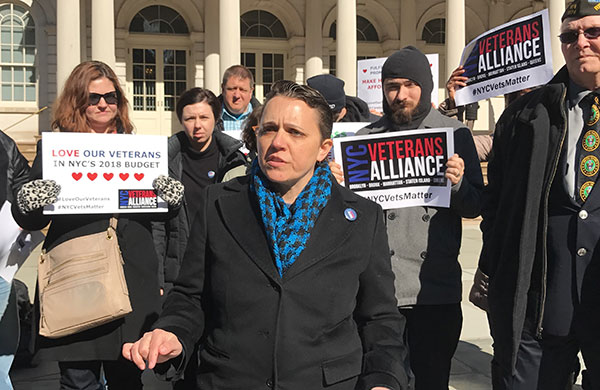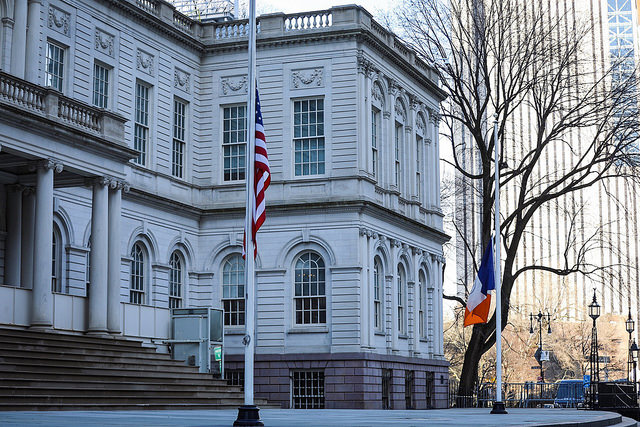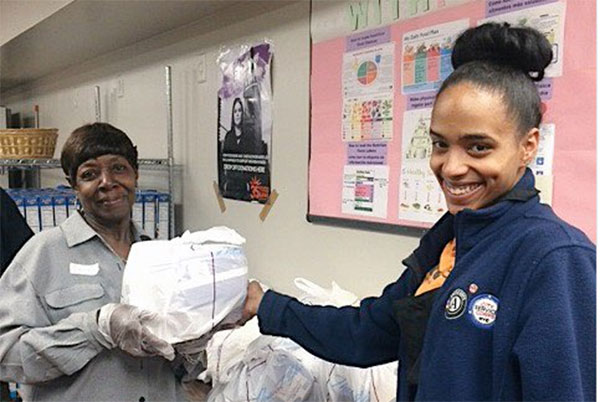What the Federal VA Leadership Change Means for New York City Veterans

Kristen Rouse, the author
Many New Yorkers may be taking in the change in leadership at the U.S. Department of Veterans Affairs as perhaps just another chapter in a uniquely tumultuous administration. For New York City’s more than 220,000 veterans, however, far more is at stake than just the latest presidential intrigue.
As hearings begin for Rear Admiral Ronny Jackson—an accomplished Naval officer who has served as personal physician to George W. Bush, Barack Obama, and Donald Trump—New Yorkers should be listening in for issues directly affecting our city and region.
Dr. David Shulkin was open and accessible to veteran leaders during his tenure as VA Secretary, which was an important factor for the many VSOs who continued to back Shulkin despite his ethical violations. Both a physician and reformer, Shulkin presided over important bipartisan reforms and was held in high regard as a leader who could get things done for a bureaucracy with a budget of nearly $200 billion and employing more than 370,000 employees, with facilities in all 50 states, four territories, and the Philippines. Shulkin made frequent appearances in New York City, and listened often to the concerns of veteran leaders.
I spoke with Shulkin last November following our community’s shutdown of a proposal that would’ve ended outpatient surgeries at the Brooklyn VA Medical Center. We raised the alarm, and Brooklyn elected leaders, led by Rep. Dan Donovan, took a stand against the move. I was relieved to have Shulkin tell me personally that he didn’t support scaling back services at New York City VA hospitals.
NYC Veterans Alliance members continue to express concern about what’s happening at our VA medical centers located in Manhattan, Brooklyn, and the Bronx. Although veterans generally express satisfaction with the care they receive at the VA’s New York City hospitals, they remain concerned that existing VA services and programs remain in place and continue to improve. Appointment wait times still need to come down. The VA Choice program is too often a bureaucratic nightmare. Staffing shortages plague the VA locally and nationwide. And the Manhattan VA hospital is still undergoing renovations to recover from the damage that Superstorm Sandy inflicted more than five years ago.
With Shulkin’s removal, the future of the VA, locally and nationally, is called into question.
We don’t know yet if Rear Admiral Jackson would give us the same assurance that Shulkin did to protect New York City hospitals. And it remains unclear whether the administration intends on moving toward privatizing VA healthcare. But it’s not simply VA healthcare at stake in New York City—it’s the processing time for VA disability ratings and appeals; management of pensions, home loans, and educational benefits; and sustained funding for the highly effective programs that have reduced veteran homelessness by 90% since 2011 -- all of which countless veterans and families across the New York City Metro area have earned and must be able to rely on, now and into the future.
Congress needs to do the work of determining whether Rear Admiral Jackson’s distinguished career has adequately prepared him to manage a massive government agency that still must undergo transformation in technology and organizational culture. Our New York City congressional delegation must especially ensure that funding stays in place to continue the delivery and improvement of existing services, programs, and benefits for our city’s veterans well into the future.
***
Kristen L. Rouse is a U.S. Army veteran and founding director of NYC Veterans Alliance. On Twitter @TrueBoots and @NYCVetsAlliance.
***
Have an op-ed idea or submission for Gotham Gazette? Email This email address is being protected from spambots. You need JavaScript enabled to view it.
Revising The People’s Charter with Open Minds

City Hall (photo: Benjamin Kanter/Mayor's Office)
Revision of the City Charter, our central governing document, should not be a one-person show, focused on a single issue. Over the last 25 years, charter revision commissions have been wielded as political tools by mayors to block the building of a West Side Stadium, keep a political rival from potentially ascending to the mayoralty, and stop a referendum that would have limited the size of public school classes. Revisions have largely been narrow and myopic and the end results have been pre-baked according to the mayor’s will.
The last truly transformative commission, convened in 1989, only came about in response to a Supreme Court decision and a series of scandals too big to ignore. But today, that all changes.
We believe this city can do better. A new charter revision commission, which was approved Wednesday by the City Council, can and should be truly democratic and capable of broad systemic reform without predetermined conclusions.
We support campaign finance reform, but also believe that the city’s land use, budget, and planning processes must be overhauled. We want to see the creation of a charter revision commission, but do not believe it should be an extension of one person’s will. That is why we proposed a commission on which no one official would have majority control and that would examine the charter as a whole, without preconditions or marching orders.
We have thought a lot about New York City’s foundational governing document and have numerous specific proposals we would like to see considered. But what we really want is a truly independent commission that will enter the process with open ears and open minds - something that the entire City Council agrees with. Everything should be on the table, nothing should be off limits, and the final product should not be preordained by anyone. We proposed this as elected officials whose very offices have been threatened with elimination in past revisions, so it should be clear we have the courage of our convictions.
Mayor de Blasio’s proposal to lower campaign contribution limits through a revision commission he is calling is a commendable attempt to limit the influence of money in politics. Our commission, which was proposed before the mayor’s, is not a rebuke of his specific policy goals. But our intention is to create a commission that will consider the entire charter and put forth a set of proposals on whatever needs fixing.
It has been nearly 30 years since the City Charter has truly been looked at top-to-bottom with an eye towards real reform. The people of this city deserve an independent commission that will not be directed to take a specific action, but charged with the responsibility to look at the whole picture and bring its recommendations to the people. It should consider whether the Council should have more say over the budget process, whether communities will have more input in land use before deals are all but finalized, whether our current system of checks-and-balances is sufficient to ensure meaningful oversight of mayoral agencies. Those discussions will not be had if the mayor simply appoints a slate of proxies and tells them what to consider and what conclusions to reach.
This does not need to be a zero-sum game, or even a competition. The mayor’s commission can move forward and pursue the ‘democracy agenda’ he envisions. Meanwhile his four appointees can join our commission for an open discussion of what else our charter needs to do to grow and change along with the city. The City Council has already expressed its support and, if the mayor will join us, we can all come together to do what’s best for the people of New York.
***
Gale Brewer is Manhattan Borough President and Letitia James is Public Advocate. On Twitter @GaleABrewer and @TishJames.
***
Have an op-ed idea or submission for Gotham Gazette? Email This email address is being protected from spambots. You need JavaScript enabled to view it.
The Woman to Woman Campaign

Donating feminine hygiene supplies through Food Bank (photo via @FoodBank4NYC)
The nearly one million women and girls living below the federal poverty level in New York City are often forced to make impossible sacrifices when it comes to their basic needs. Limited budgets mean having to choose between purchasing essentials, like feminine care and household products, and paying for other necessities, like rent and food.
The cost of these feminine care products adds up. On average, women between the ages of 12 and 54 buy approximately 250 feminine care products every year, including pads, tampons, and panty liners. That presents a significant financial burden to families already struggling to balance the competing costs of everyday living expenses and turns basic essentials into luxury products.
Part of the challenge is that low-income families have little support to help defray the cost of non-food essentials, and there is no reliable source of regular donations of sanitary napkins or tampons available to those in need. This means the majority of families struggling to put food on the table have no choice but to pay out of pocket for these necessary items.
This issue is more than a matter of health and hygiene—it’s a matter of dignity. Girls faced with the prospect of attending school without the products they need will opt to skip class, harming their chances at success to avoid embarrassment. Similarly, women in the workplace often encounter these same dilemmas. Our city has made significant recent strides by enacting legislation to ensure women and girls in public schools, shelters, and jails have access to the supplies they need. And the budget just enacted in Albany extends access to public schools throughout the state. But there’s more work to be done.
That’s why Food Bank For New York City launched Woman to Woman, a campaign to make New York the first city to offer feminine care products at all of its food pantries. We are committed to establishing a regular supply of products and creating first-time space on pantry shelves to meet the basic needs of women and girls living in poverty because these New Yorkers face burdens that food alone cannot ease.
This year, we are asking for donations of products and funds to help the women of our city. Right now, thanks to generous support from the City Council, feminine care products are available at 25 of Food Bank’s campus pantries in public schools across the five boroughs but the need is far greater. Almost three in four (73 percent) food pantries and soup kitchens say they need more household and hygiene items to better serve their communities.
This is an opportunity for New Yorkers to take the lead in caring for their most vulnerable neighbors. Needed items include tampons, pads and panty liners, as well as toothpaste, toothbrushes, baby wipes, adult diapers, shampoo, conditioner, and deodorant.
People can continue to donate these products at locations throughout the city. They can also coordinate a product drive at their workplace or rally their friends by hosting an online fundraiser. Additionally, volunteers can sign up to repack donated products at Food Bank’s Bronx warehouse so that they’re ready for distribution to our network of 1,000 charities across the city.
Last, we are calling on New Yorkers to raise their awareness and help remove the stigma and embarrassment around menstrual health. Addressing this problem means having a public conversation about the terrible choices women and girls living in poverty confront every day. No one should be ashamed to need a tampon and the more people talk about it, the better.
By having a greater understanding of the unique challenges women face, especially in an expensive city like New York, we can help overcome them. Ensuring all New Yorkers have full access to the range of essential items they need will help everyone achieve greater dignity, independence, and success.
***
Margarette Purvis is CEO of Food Bank For New York City. On Twitter @FoodBank_Prez & @FoodBank4NYC.
***
Have an op-ed idea or submission for Gotham Gazette? Email This email address is being protected from spambots. You need JavaScript enabled to view it.




